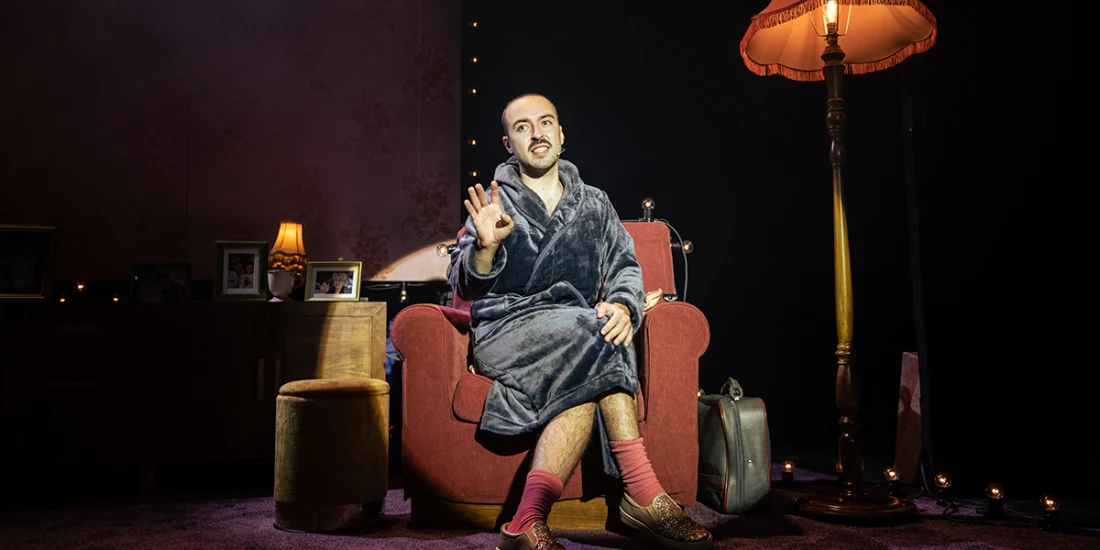'My Son's a Queer (But What Can You Do?)' review — a celebration of being your best, most theatrical self
The little show that could has taken up a heartfelt residency in the West End, following runs at Battersea’s Turbine Theatre and this year’s Edinburgh Festival that helped spread the word as to the production’s charm – and clout. Making history (according to its producer) as the first West End show to use the word “queer” in the title, My Son’s a Queer (But What Can You Do?) chronicles the rise and rise of its non-binary solo performer. A veteran of Les Mis and Mary Poppins, to name but two established titles, Rob Madge has now turned their life-to-date into a 75-minute celebration of being your best and truest self.
We hear of the long-delayed birth, following three rounds of IVF, of an only child who was born in the Midlands into seemingly the most supportive family imaginable. A performer from the off, young Madge took to the apparently omnipresent camera that caught every embryonic thespian foray on tape. “Anything is possible when the stage is your living room,” we are told, and the set bears that assertion out: Chest drawers form an ad hoc staircase, and the backdrop is – what else? - a giant TV screen.
Not exactly backwards about coming forward, the pre-pubescent Madge plunders every opportunity to put themselves on parade, as we discover via a sequence of captioned videos from their past. Frequent misspellings (“asylum” proves a tricky one) are part of the amateur appeal as these home movies unspool.
Appearing before us in a vest and shorts that allow them to don multiple costumes as the piece nears its climax, the adult Madge is considerably more wry and self-aware than their enthusiastically precocious younger self. (I doubt the sweet-faced Madge seen on screen in an inflatable wading pool had any idea that an innocent reference to “swallowing a mouthful” would be open to other interpretations later on.)
The material is bound to resonate in all sorts of ways, whether or not you identified as a child with Beauty or the Beast – Madge wanted to be Belle – or loathed the expectation that a boy and a football are an innate match. Madge’s childhood appears to have been an extended opportunity for an exuberant Disney parade, and one in which their entire family seemed to participate with unceasing good cheer. Madge’s dad, indeed, emerges as the unexpected hero of the piece: a loving parent turned de facto stage manager and ally. More to the point, his innate tolerance didn’t need signalling, but existed as second nature to a generosity of spirit that makes one wonder whether this family ever uttered a cross word. Madge’s extended relatives – grandma included - share in the prevailing high spirits.
Such obstacles as there were came from the outside world – bullying at school, for instance, that in a remarkable show of solidarity led Madge’s mum to apply for work at the same school as a dinner lady. Young Madge is seen sporting a Santa hat with plaits one minute and being interviewed about appearing in Mary Poppins the next, while the wiser and possibly warier adult Madge fields showbiz jokes involving Connie Fisher, the musical Six, and “good Cinderella” – that last one brings down the house.
The director, Luke Sheppard, is shortly to make his Broadway debut with & Juliet, and you sometimes wish a more forceful outside eye had urged the Madge we see before us to tease out this story in ways that didn’t rely quite so entirely on the past to inform the present. A quip early on compares this solo effort to “Fleabag - without the anal,” except that Phoebe Waller-Bridge’s career-making alter ego digs infinitely more deeply than is ever attempted here.
Madge talks at one point of embracing performance as a way to enter into another self, so it seems marginally surprising that no one has clocked the irony of a piece that depends for emphasis and power on the unfurling revelation of Madge’s own self: How they went from there to here has to be taken somewhat on faith given a narrative that simply skips over those periods that don’t have a filmed correlative – their arrival, for instance, at a present-day identity.
The goal is clearly to catch playgoers up in the shared joy of self-assertion that many will recognise from the likes of Torch Song Trilogy and La Cage aux Folles, to cite two gay-themed shows that both played the West End (and Broadway) decades ago, in effect paving the way for Madge’s achievement here.
It’s revealing when a report card on the young Madge informs their parents of “your flamboyant monster of a child,” only for the intervening decades to reveal a confident performer who can more than hold centre stage: What you see conjoins Alan Cumming’s insouciance crossed with the open-faced appeal of a younger Matt Lucas. Where does Madge go next in what, after all, is a still-young life? That remains to be seen even as, for now, My Son’s a Queer recounts a near-blessed upbringing, all but demanding that Madge’s family take its own richly deserved bow.
Photo credit: Rob Madge in My Son's a Queer. (Photo by Mark Senior)
Originally published on
